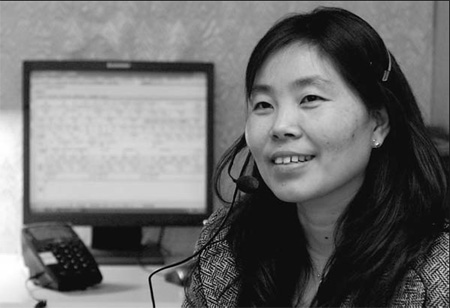Saving the lives on the line
At 4 am one spring day, Wang Cuiling was sitting alone in her workroom, dozing away her 16-hour shift.
But she was shaken out of her stupor when the phone rang and a weak, low voice spoke to her.
 |
|
Wang Cuiling, 42, head of China's first 24-hour suicide prevention hotline under the Beijing Huilongguan Hospital. |
"I just cut my wrist. The wound is deep and blood is all over the floor "
Wang felt herself shivering all over from the call.
That was seven years ago. Wang is now the head of a suicide prevention hotline. But she still remembers the fear from her first phone conversation with someone who wanted to commit suicide.
"Operating a suicide prevention hotline is challenging, but that is the very reason I love it," Wang said.
"The challenges urge me to grow more as a person," she said.
Wang, 42, used to be a nurse at the Beijing Huilongguan Hospital, one of the three largest psychiatric hospitals in the country. She became an operator when the suicide hotline was started eight years ago.
At the end of 2002, the Beijing Huilongguan Hospital opened China's first 24-hour suicide prevention hotline. By last April, it had received 530,000 incoming calls, answered 130,000 and saved more than 5,000 callers who tried to kill themselves. The number, 800-810-1117, was known as "the lifeline".
However, when Wang started her career at the hotline, she barely had any idea about the psychology behind her work.
"The training and back-up system was not complete at the beginning. I started to take the phones only after three days of training," she said.
"Luckily, there were no high-risk cases," Wang said.
High-risk callers refer to those who have "feasible plans" to kill themselves and make up 5 percent of total calls, Wang said.
Among the 34 to 40 phone calls the hotline receives every 24 hours, 80 percent are just calling to express their resentment over issues and pour out their troubles.
After a few months working on the line, Wang initially became sick of the callers' pessimism and sorrow.
"All the callers said their lives were messed up, but I felt it was not my fault," she said.
Wang used to be, in her own words, a "self-willed" person. She soon became impatient with the callers' problems.
"I tried to hide my feelings. But once you mix your own feelings with the callers', you won't be able to focus on their problems in an objective manner," she said.
To do her job better, Wang attended psychotherapy classes and earned a postgraduate degree from the Chinese Academy of Sciences in 2004. As her knowledge on psychology accumulated, Wang gradually understood the bitterness of the callers.
 0
0 






